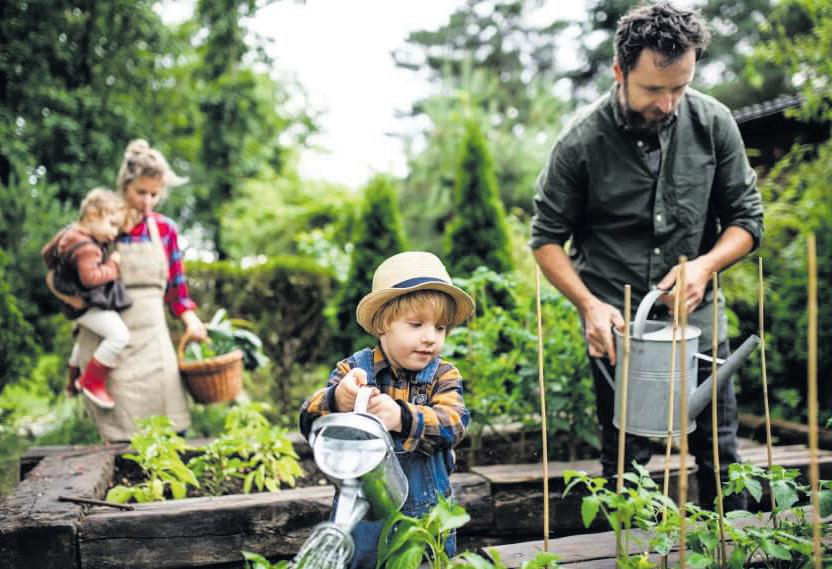
2 minute read
The Benefts of Gardening with Children

By Liam Jennings
Gardening with children is a wonderful and enriching experience that goes beyond simply growing plants. It is a hands-on educational activity that instils a love for nature, promotes physical and mental well-being, and fosters essential life skills. As children dig, sow, and nurture their garden, they embark on a journey of discovery and learning that nurtures their growth and development. In this article, we’ll explore the numerous benefts of gardening with children and why it’s a valuable endeavour for parents, educators, and young ones alike.
In an age of digital dominance, gardening offers children a unique opportunity to connect with the natural world. By engaging with soil, plants, and insects, children develop a profound appreciation for the environment. This connection with nature nurtures empathy, respect, and a sense of responsibility towards the Earth.
Gardening is an excellent form of physical activity for children. Digging, planting, weeding, and watering all involve physical effort, contributing to their overall ftness and well-being. It encourages outdoor play and helps children build gross and
As children care for their garden, they develop a sense of responsibility and patience. They understand that plants require nurturing and attention to thrive.
Gardening teaches patience translate into other aspects of their lives.
Gardening engages all the senses, making it a rich sensory experience for children. They feel the soil’s texture, smell the fragrance of fowers, lasting memories of their garden adventures.
Gardening provides children with a creative outlet. They can design their garden layout, choose plant varieties, and create imaginative garden decorations. This creative freedom sparks their imagination and encourages them to think outside the box.
Gardening has a calming effect on children, reducing stress and anxiety. Being amidst nature and the act of gardening can be therapeutic, providing a sense of tranquillity and mindfulness. Gardening and learning from failure. Not every plant will thrive, and setbacks may occur, such as pests or unfavourable weather conditions. Such experiences provide valuable lessons about perseverance and problem-solving. fne motor skills as they handle gardening tools and delicate plants. children about the consequences of their actions, as they witness the results of proper care or neglect. This responsibility and hear the rustling of leaves, and taste the fruits of their labour. This sensory stimulation enhances their cognitive development and creates can be particularly benefcial for children with attention issues or behavioural challenges, as it offers a constructive outlet for their energy.

Gardening is an excellent bonding activity for families and friends. Working together in the garden fosters meaningful connections and creates lasting memories.
Children cherish the time spent with their parents, grandparents, or siblings, and these shared experiences strengthen their relationships.
Gardening is an immersive science lesson for children. It provides hands-on experiences in biology, botany, ecology, and even chemistry. Children learn about the life cycle of plants, the role of sunlight and water in photosynthesis, and the importance of nutrients in plant growth. These practical lessons deepen their understanding of scientifc concepts.
Growing their fruits and vegetables can foster a stronger awareness of nutrition in children. As they witness the entire process from planting seeds to harvesting produce, they understand the value of fresh, wholesome foods. This knowledge can positively infuence their dietary choices and promote a healthier lifestyle.
Gardening also teaches children about resilience

Gardening instils a sense of environmental stewardship in children. They learn about sustainable practices, composting, and reducing waste. These eco-conscious habits can stay with them throughout their lives, making them more responsible global citizens.
Gardening with children is a rewarding and benefcial experience with a myriad of positive outcomes. From fostering a connection with nature to promoting physical activity, learning about science, and developing life skills, gardening offers an all-encompassing educational journey for young minds. The joy of seeing a tiny seed grow into a fourishing plant is a priceless gift that nurtures their growth and development in countless ways. So, grab a trowel, gather the little ones, and let the gardening adventure begin!










